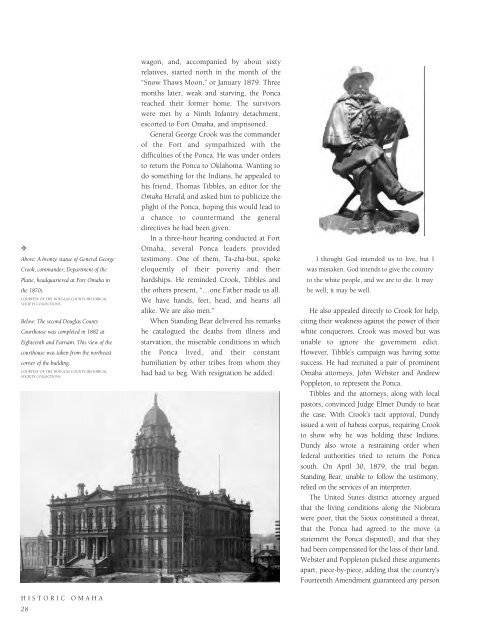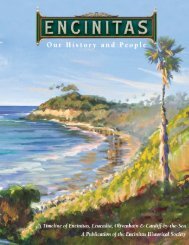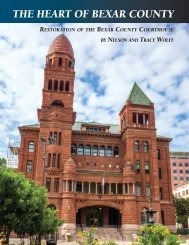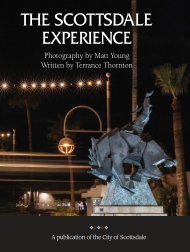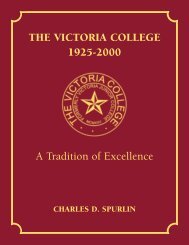Historic Omaha
An illustrated history of Omaha and the Douglas County area, paired with the histories of companies, families and organizations that make the region great.
An illustrated history of Omaha and the Douglas County area, paired with the histories of companies, families and organizations that make the region great.
You also want an ePaper? Increase the reach of your titles
YUMPU automatically turns print PDFs into web optimized ePapers that Google loves.
✧<br />
Above: A bronze statue of General George<br />
Crook, commander, Department of the<br />
Platte, headquartered at Fort <strong>Omaha</strong> in<br />
the 1870s.<br />
COURTESY OF THE DOUGLAS COUNTY HISTORICAL<br />
SOCIETY COLLECTIONS.<br />
Below: The second Douglas County<br />
Courthouse was completed in 1882 at<br />
Eighteenth and Farnam. This view of the<br />
courthouse was taken from the northeast<br />
corner of the building.<br />
COURTESY OF THE DOUGLAS COUNTY HISTORICAL<br />
SOCIETY COLLECTIONS.<br />
wagon, and, accompanied by about sixty<br />
relatives, started north in the month of the<br />
“Snow Thaws Moon,” or January 1879. Three<br />
months later, weak and starving, the Ponca<br />
reached their former home. The survivors<br />
were met by a Ninth Infantry detachment,<br />
escorted to Fort <strong>Omaha</strong>, and imprisoned.<br />
General George Crook was the commander<br />
of the Fort and sympathized with the<br />
difficulties of the Ponca. He was under orders<br />
to return the Ponca to Oklahoma. Wanting to<br />
do something for the Indians, he appealed to<br />
his friend, Thomas Tibbles, an editor for the<br />
<strong>Omaha</strong> Herald, and asked him to publicize the<br />
plight of the Ponca, hoping this would lead to<br />
a chance to countermand the general<br />
directives he had been given.<br />
In a three-hour hearing conducted at Fort<br />
<strong>Omaha</strong>, several Ponca leaders provided<br />
testimony. One of them, Ta-zha-but, spoke<br />
eloquently of their poverty and their<br />
hardships. He reminded Crook, Tibbles and<br />
the others present, “…one Father made us all.<br />
We have hands, feet, head, and hearts all<br />
alike. We are also men.”<br />
When Standing Bear delivered his remarks<br />
he catalogued the deaths from illness and<br />
starvation, the miserable conditions in which<br />
the Ponca lived, and their constant<br />
humiliation by other tribes from whom they<br />
had had to beg. With resignation he added:<br />
I thought God intended us to live, but I<br />
was mistaken. God intends to give the country<br />
to the white people, and we are to die. It may<br />
be well; it may be well.<br />
He also appealed directly to Crook for help,<br />
citing their weakness against the power of their<br />
white conquerors. Crook was moved but was<br />
unable to ignore the government edict.<br />
However, Tibble’s campaign was having some<br />
success. He had recruited a pair of prominent<br />
<strong>Omaha</strong> attorneys, John Webster and Andrew<br />
Poppleton, to represent the Ponca.<br />
Tibbles and the attorneys, along with local<br />
pastors, convinced Judge Elmer Dundy to hear<br />
the case. With Crook’s tacit approval, Dundy<br />
issued a writ of habeas corpus, requiring Crook<br />
to show why he was holding these Indians.<br />
Dundy also wrote a restraining order when<br />
federal authorities tried to return the Ponca<br />
south. On April 30, 1879, the trial began.<br />
Standing Bear, unable to follow the testimony,<br />
relied on the services of an interpreter.<br />
The United States district attorney argued<br />
that the living conditions along the Niobrara<br />
were poor, that the Sioux constituted a threat,<br />
that the Ponca had agreed to the move (a<br />
statement the Ponca disputed), and that they<br />
had been compensated for the loss of their land.<br />
Webster and Poppleton picked these arguments<br />
apart, piece-by-piece, adding that the country’s<br />
Fourteenth Amendment guaranteed any person<br />
HISTORIC OMAHA<br />
28


